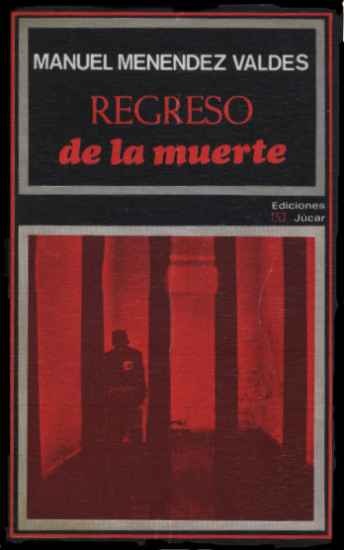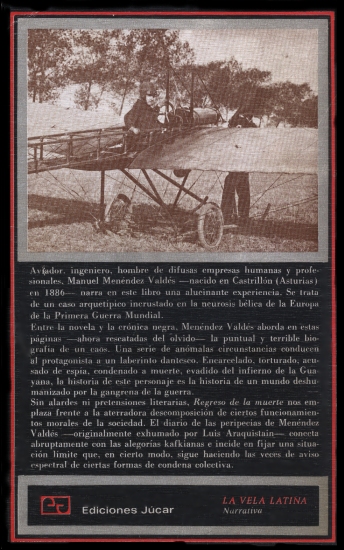

 |
 |
En Español Entre la novela y la crónica negra. Menéndez Valdés aborda en estas páginas -- ahora rescatadas del olvido -- la puntual y terrible biografia de un caos. Una serie de anómalas circunstancias conducen al protagonista a un laberinto dantesco. Encarcelado, torturado, acusado de espia, condenado a muerte, evadido del infiierno de la Guayana, la historia de este personaje es la historia de un mundo deshumanizado por la gangrena de la guerra. Sin alardes ni pretensiones literarias, Regreso de la muerte nos emplaza frente a la aterradora descomposición de ciertos funcionamientos morales de la sociedad. El diario de las perispecias de Menéndez Valdés -- originalmente exhumado por Luis Araquistain -- conecta abruptamente con las alegorias kafkianas e incide en fijar una situación limite que, en cierto modo, sique haciendo las bveces de aviso espectral de ciertas formas de condena colectiva. |
English Version Between the novel and the black chronicle, Menéndez Valdés approaches in these pages, now rescued from the oblivion, the punctual and terrible biography of a chaos. A series of anomalous circumstances lead the protagonist to a dantesque labyrinth. Imprisoned, tortured, accused of being a spy, condemned to death, escaped from the hell of Guyana, the history of this personage is the history of a world dehumanized by the gangrene of war. Without displays or literary aspiration, Return from death places us in front of the terrifying corruption of certain moral functionings of society. The diary of Menéndez Valdés' perispecias, originally rescued by Luis Araquistain, connects in an abrupt way with the Kafkaian allegories and settles a limit situation that, in a certain way, continues being a ghostly advice of certain forms of collective condemnation. |
|
|
by Domingo Gómez Gallego, 12-31-07 It was published for the second time in 1974, by the editorial Jucar, with the title changed to 'Regreso de la muerte' ('Return from death'). This edition, (which is the one I have), also includes Araquistain's prologue, but nothing new. It doesn't provide any additional information, other than a few general facts found on the back cover of the book. Jucar doesn't exist now, and the book has again fallen into oblivion. Nevertherless, I found that it is digitalized in Google Books, allthough it can't be fully read. The narration itself is an autobiographical relation in form of a diary, narrated in first person, in the present tense and without any literary ambition. But the result is quite entertaining and serves to interest the reader into the luck of the protagonist, so it can be read sometimes as a modest penitentiary novel with some ingredients of adventure and a thriller. The narration begins 'in media res' with his arrival in Paris the third of May of 1918. He has a contract to work in a factory of aeroplanes for the war, situated in Colombes, in which the Spad was being built. His job was to inspect the motors. During the first days, he gets in touch with some fellow engineers and is invited to see the tests of the Marne dirigible. He flies over Paris as a passenger in a combat aeroplane piloted by the French aviator Vencourt (feeling impressed when he thought about the possible eventualities a war pilot had to afford in a combat). He also visits the Renault factory, where he plans to transfer in order to get a higher salary. This change of work place will be frustrated by his arrest in the 19th of May. Falsely accused of sabotaging the aeroplanes on which he had worked, spying for the enemy and conspiring, he never was given the presumption of innocence. After being almost tortured by the police, he is imprisoned in La Sante jail. The 27th of August, he is judged and comdemmed to death. For the next 7 months, he will wait in La Sante to be executed, but the 24th of November, with the war over, his penalty is commuted to perpetual hard labor. Then he is transfered to several prisons before being sent to the port of La Rochele to be exiled to the French prison colony of Guiana. According to Menéndez Valdés' description, the Guiana jail was quite terrible. It was situated in the middle of a jungle, inhabitated by hostile inatives, in a hot and wet place and very far from the nearest civilized village. During the day, the prisoners were forced to work cutting trees. While working out, he gained the confidence of a native who he used to send uncensored messages to his family, asking them for money for his plans of escape. Insteed of sending him money, his brother himself travels from Spain to the area and contracts the cooperation of Dutch adventurers, the Ransey, who organizes his escape through the jungle, gives him a provisional new identity and provides shelter until he finally embarks back to Spain. Unfortunatelly, in his narration Menéndez Valdés gives us very little information about his early years, his education or his past activities. By reading the text we come to know that, at that time, he had a son, at least a brother and two sisters, and that he was born in Santiago del Monte, a small village in the town council of Castrillón, located in the northern region Asturias. Also, that he became a pilot in the Deperdussin house, as he says in page 29. But he reveals almost nothing else. I have to add that, curiously, next to the small village in which he was born, is located now the only airport of the region. I know it quite well, becouse I also live in that town council, Castrillón. I am sorry to say that Manuel Menéndez Valdés remains a unknown person to my neighbors, as it would have been for me had I not found his book in a secondhand bookstore (and later the information about him in your web). That's why I would like to encourage you to continue with the work you do on your website, that enables any curious Internet user to discover the exciting lives of the pioneers of aviation. I think that what I have tell you are the most important facts about the book. I have tried to include the information that I thought you might find to be the most interesting, allthough I have to apologize for my bad English. If there is something you don´t understand (or if you want me to expand on any particular point) please feel free to ask me. All the best, Domingo Gómez Gallego Editor's Note: We are all very grateful to Domingo for sharing this priceless historical material with us. No need to apologize for his ability in English. It serves the purpose very well, ever so much better than our ability to communicate in Spanish. |


|